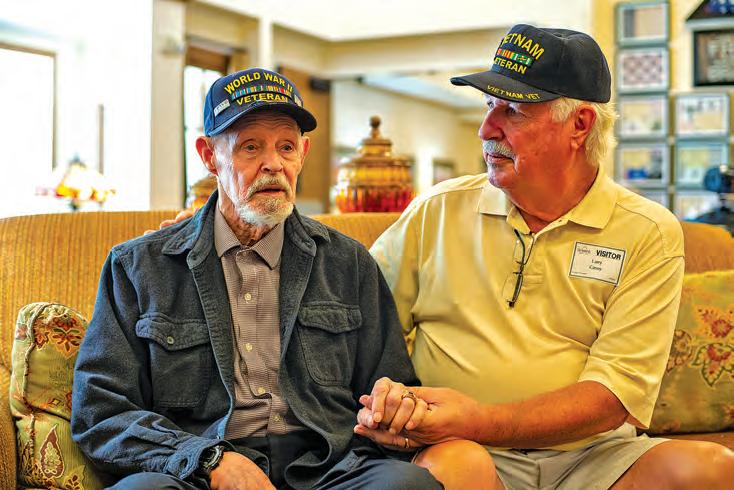
14 minute read
COMMUNITY
TheMesaTribune.com | @EVTNow /EVTNow
EV author pens new book on parental death’s impact
TRIBUNE NEWS STAFF
East Valley freelance author Michelle Shreeve was only 9 when her mother died and even 30 years later, her loss is never far from her mind.
In many ways it has shaped her career as a student and a writer.
While earning her master’s degrees in English and create e writing, one of her projects focused on how bibliotherapy and writing therapy can help children, teens, and young adults cope with the death of a parent at a young age.
She has written numerous articles for local and national publications about the impact of a parent’s death on children and teens and in 2018 published a book, titled “Parental Death: The Ultimate Teen Guide,” that was based on her interviews with 90 people ranging in age from preteen to the mid-80s. It was the 56th book in the “It HapMichelle Shreeve holds up copies of her first book on how losing a parent at a young age can impact people, like her mother’s loss did to her, for decades. (Tribune file photo)
Larry Casey of Ahwatukee, right, is planning a special celebration at Sunrise at Chandler for his father Floyd when he marks his 100th birthday on July 20. (David Minton/Arizonan
pened to Me Ultimate Teen Guide” series published by Rowman & Littlefield and is still available on a variety of book-sale websites.
This month, Shreeve is publishing a sequel to her book that is directed mainly at teens who have lost a parent and for the surviving parent trying to guide an adolescent child through the trauma of losing a mother or father.
“Parental Death: The Ultimate Teen Guide,” which is also published by Rowman & Littlefield, offers a variety of ways in which teens especially can cope with the universal difficulties of losing a parent.
She also delves into the unique dynamics of specific losses – sons who lose fathers, daughters who lose mothers, and vice-versa – and how that impacts a teen’s future development. This book also identifies how the challenges of life without a parent can affect a young adult at different stages of life.
Shreeve has been writing about parental loss and its impact since 2008 and has talked not only with counselors and ex-
seeSHREEVE page 16
Chandler WWII veteran prepares to turn 100
BY PAUL MARYNIAK
Tribune Executive Editor
He is part of a rapidly diminishing breed of men, a member of the Greatest Generation, though when you ask him what thought comes to mind when he looks back on his days as a telegraph operator in the European theater during World War II. Floyd Casey without hesitation says:
“The weather.”
“The weather was so damn cold,” recalled Floyd, who becomes a centenarian on July 20 and already is the oldest resident at the Sunrise of Chandler assisted living community. “You couldn’t think, every time you went out the door in the wintertime and summertime was so hot you couldn’t breathe.”
But Floyd survived not just the weather but every bullet and shell the Germans could fling against his units in major WWII clashes like the Battle of the Ardennes, the Battle of Central Europe, and the Battle of Rhineland – all designated by the War Department in 1945 as Bronze Service Star campaigns.
The youngest of three children who got his formal education in a one-room schoolhouse in the Finger Lakes Region of New York, Floyd was a 20-year-old sales clerk for the Atlantic & Pacific Tea Co. who had recently married his high school sweetheart at the time he enlisted in the Army in October 1941.
He eventually became a Radio Operator 740, eventually winning promotion to Tech Sergeant 4th Class after becoming proficient in both American and Morse Code as well as telegraph and typewriter skills.
Those skills were not completely new to him: he had acquired a foundation in

perts but dozens of people young and old who lost a parent as a child.
“I got creative with my own research along the way, researching writing therapy, bibliotherapy, and movie therapy, focusing on fictional relatable characters who lost a parent,” she said. “I’ve compiled lists over the years of notable society members who lost a parent young, but still gave something extraordinary back to the world such as Nobel Prize Laureates, athletes, scientists, actors, and more to serve as a healing coping mechanism.
“This book, and the research and interviews I conducted for my first book, have all been a 30 year process for me. In both books, I’ve shared what I’ve learned along the way to try and help others navigate this difficult situation.”
Shreeve felt a certain urgency to write a book that focused on the unique impact of a parent’s death on a teenager.
“When a parent dies before a child turns 20, they’re still very much dependent on them in many ways – emotionally, financially, physically, and more,” she explained. “So many changes take place and life right after their death can be really overwhelming, confusing, so many emotions are going on and they suddenly feel empty without their parent. This book would be the ideal go-to book for a child, teen, or young adult who just lost a parent, or a book for adults looking to support grieving children.”
A major undercurrent to her book is provided by real-life experiences that people of all ages shared with her,. For the first book, Shreeve put the word out on social media and through various local publications, looking for people who lost a parent as a child and she was bombarded by more than 90 letters from people of all ages. She did it again for her new book, but didn’t garner nearly as many, although she added, “I thankfully was able to interview 13 brave participants.” “The pandemic caused issues for me writing this book,” said Shreeve, explaining, “I was having trouble finding participants willing to share their story. They had a minimum amount of participant stories they wanted me to include throughout the book, and I was struggling with getting teens to commit.”
“I pretty much wrote this second book right smack in the middle of a pandemic and a recession which was no easy task,” said. “However, sadly, more than 200,000 children have lost their parent due to COVID-19 alone, so I feel like the timing of this book was meant to be, as it can serve as a helpful resource to all of these newly grieving parentless children.”
Shreeve explained, “A lot of the teens I interviewed for this book were struggling to participate, not only because they are so young and have been dealing with a lot just regarding the death of their parent alone, but also because of the at- home school transition caused by schools closing their doors due to the pandemic.”
Her subjects for the new book’s interviews ranged from 15 to 65 years old and she describes them as “brave” because “it’s not easy to share your story, especially when you’re young and the loss is so new.
“I was there in that position once myself and completely get it.”
One of her most memorable interviews involved a young teen who had lost one parent around the time she wrote her first book and the other around the time she was preparing the new one.
“My heart broke for that participant because the participant is still just a young teenager and has already gone through two tragic parental losses,” Shreeve said.
Now that the new book is ready to hit book shelves, she said, “I’m very thankful for the participants who came forward,
CENTENARIAN from page 15
them as a Boy Scout in his small Finger Lakes Region hometown of Addison, New York.
But the job was not without hardship and danger.
After getting conditioned for cold weather in training camps in Wisconsin and Upper Michigan, he was shipped to the European Theater – “it took 14 days to get there and only three to come back on the Queen Elizabeth,” he said. He spent hours each day with a five-man radio communications team relaying and fielding messages between various Allied outposts, working “as long as you could stay awake.”
One day during the Battle of the Bulge, he was in the back of a canvas-covered transport when “a very big piece of metal” crashed through the canvas and “slammed into the radio and smashed it to bits,” he said. “We had to go back and get all new radios.”
During that same battle, he recalled, at some points “we were all huddled together and could hear the shells” without knowing exactly where they were coming from. He was grateful he could hear them he said, because the conventional wisdom of the battlefront was “if you can’t hear them before you see them, it’s too late.”
For his service, Floyd received the American Service Medal; European African Middle Eastern Service Medal; Good Conduct Medal and was honorably discharged in October 1945. By then the first of his five children was close to turning 5 and as his family grew, he eventually left A&P, where he had risen to a manager position, and became a switchman for the Baltimore and Ohio Railroad in Elmira, New York. His late wife, Norma, and their five children – Norman, Bonnie, Larry, Stacy and Dennis – lived in a small house in Elmira. New York, until 1959 before they moved to Horseheads, New York, to work at a Westinghouse plant, where he was one of the first men in the country to work on cathode ray tubes used in cameras for outer-space travel, specifically the moon landing. His five children have given him 18 grandchildren, 11 great grandchildren, and one great, great grandchild.
Floyd moved to Florida after his wife passed away form cancer in 1985 and lived there until 2017, when he moved to Ahwatukee to live with his middle child, Larry Casey, and his wife Dianne.
But after three years or so, Floyd decided he wanted the camaraderie and companionship of people his own age and so he moved to Sunrise at Chandler.
His son Larry is planning a special celebration for Floyd’s birthday and is rounding up fellow veterans for a motorcycle parade past Sunrise at Chandler on his birthday. Sunrise at Chandler also has arranged a visit from the Quilt of Honor Foundation, which will present him with one of the handmade quilts its members make for any veteran who has been
Michelle Shreeve’s new book examines the impact of a parent’s death on a teenager. (Special to the Tribune)

seeSHREEVE page 17
touched by war.
Later that day, Larry plans to treat the residents and staff at Sunrise to a barbecue on the premises.
Floyd seems to take turning a century old in stride. A football and track-and-field star in high school, he still exercises most days, using 5-pound weights to do arm curls. But he misses fishing and golf – he was pretty good at both, he said.
He attributes his longevity to “all the vitamins and minerals I took” when he and his wife were distributors for a health supplements company.
He still keeps up on current events and marvels at all the changes and advances in so many facets of society that he has seen.
Maybe that’s why when asked what the biggest difference he sees between today and years gone by, he seemed a little startled at the mind-boggling nature of the question and then simply replied, “Everything is different.”
for had they not, this book, as well as my first one, would not have been made to try and help others.” ... She said her book “can also be a helpful resource for grieving families, teachers, school administrators, counselors, organizations, and other supportive adults looking to help guide and support youth trying to navigate the death of their parent.”
“My hope for this book is that no child, teen, young adult, or grieving family will think they are alone in navigating this tragic situation,” Shreeve said, “and that every reader can walk away feeling like there’s at least one person on the planet that can relate to what they’re going through and that some of my research and individual chapters can give positive insight into their loss to help guide them to a positive future.
“I hope readers will appreciate the bravery my 13 participants had by sharing their personal story of the death of their parent when they were young that can also provide many unique perspectives that can hopefully help readers as well. “
GOT NEWS?
Contact Paul Maryniak at 480-898-5647 or pmaryniak@ TimesLocalMedia.com

BE BALLOT READY
FOR THE AUGUST PRIMARY ELECTION
We all play a role in ensuring secure, transparent and accurate elections. The Maricopa County Elections Department is here to help your community Be Ballot Ready! What can you do?


Learn more at:

BROUGHT TO YOU BY:
FOR VOICE INFO, CALL 602-506-1511
PERIPHERAL NEUROPATHY AND CHRONIC PAIN WARNING!
Our clinic is taking every precaution and we follow strict CDC guidelines to ensure that our patients, clinic and staff are SAFE!
Mesa, AZ — The most common method your doctor will recommend to treat your chronic pain and/or neuropathy is with prescription drugs that may temporarily reduce your symptoms. These drugs have names such as Gabapentin, Lyrica, Cymbalta, and Neurontin, and are primarily antidepressant or anti-seizure drugs. These drugs may cause you to feel uncomfortable and have a variety of harmful side effects. Chronic pain and/or peripheral neuropathy is a result of damage to the nerves often causing weakness, pain, numbness, tingling, and the most debilitating balance problems. This damage is commonly caused by a lack of blood flow to the nerves in the hands and feet which causes the nerves to begin to degenerate due to lack of nutrient flow.
As you can see in Figure 2, as the blood vessels that surround the nerves become diseased they shrivel up which causes the nerves to not get the nutrients to continue to survive. When these nerves begin to “die” they cause you to have balance problems, pain, numbness, tingling, burning, and many additional symptoms. The main problem is that your doctor has told you to just live with the problem or try the drugs which you don’t like taking because they make you feel uncomfortable. There is now a facility right here in Mesa that offers you hope without taking those endless drugs with serious side effects. (See the special neuropathy severity examination at the end of this article) In order to effectively treat your neuropathy three factors must be determined. 1) What is the underlying cause? 2) How much nerve damage has been sustained. NOTE: Once you have sustained 95% nerve loss, there is likely nothing that we can do for you. 3) How much treatment will your condition require? The treatment that is provided at Aspen Medical has three main goals. 1) Increase blood flow 2) Stimulate and increase small fiber nerves 3) Decrease brain-based pain The treatment to increase blood flow, stimulate small nerve fibers and get you back to health is our new $50,000.00 SANEXAS UNIT! In addition, we use a state-of-the-art diagnostics like the TM Flow diagnostic unit to accurately determine the increase in blood flow and a small skin biopsy to accurately determine the increase in small nerve fibers! The Sanexas electric cell signaling system delivers energy to the affected area of your body at varying wavelengths, including both low-frequency and middle-frequency signals. It also uses amplitude modulated (AM) and frequency modulated (FM) signaling. During a treatment session, the Sanexas system automatically changes to simultaneously deliver AM and FM electric cell signal energy. THE GREAT NEWS IS THAT SANEXAS IS COVERED BY MEDICARE AND MOST INSURANCE! Depending on your coverage, your treatment could be little to no cost to you! The amount of treatment needed to allow the nerves to fully recover varies from person to person and can only be determined after a detailed neurological and vascular evaluation. As long as you have not sustained at least 95% nerve damage there is hope! Aspen Medical will do a chronic pain and neuropathy severity examination to determine the extent of the nerve damage as a public service to you and/or your family and friends. This neuropathy/ pain severity examination will consist of a detailed sensory evaluation, extensive peripheral vascular testing, and a detailed analysis of the findings of your neuropathy.
Fig. 2
Aspen Medical will be offering this chronic pain and neuropathy severity examination from now until July 31, 2022. Call 480-
274-3157 to make an appointment to determine if your chronic pain and peripheral neuropathy can be successfully treated. Due to our very busy office schedule, we are limiting this FREE consultation offer to the first 15 callers. YOU DO NOT HAVE TO SUFFER ANOTHER MINUTE, CALL Call 480-274-3157 … NOW!
We are extremely busy and if your call goes to our voicemail, please leave a message and we will get back to you asap.
480-274-3157
4540 E Baseline Rd., Suite 119 Mesa Az 85206




